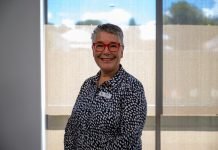A Melbourne-based research project is working to improve social connection for older women living alone.
Bolton Clarke Research Institute’s Older Women Living Alone project, funded through a $250,000 Lord Mayor’s Charitable Foundation grant, is entering a new phase as it seeks to develop concepts that will lead to new interventions supporting wellbeing for older women.
The two-year project has included a recently complete series of interviews and forums with about 50 older women aged 55+ living alone in Melbourne, building on an analysis of data from more than 50,000 older women living alone.
Women living alone comprise 40 per cent of all women over 55 accessing Bolton Clarke services, and are more likely to have complex health issues.
Research Project Manager Marissa Dickins said Australian women were living longer and older women were at increased risk of homelessness, poverty and factors affecting physical and mental wellbeing.
“Not only is social isolation an unpleasant experience in and of itself, it is also associated with higher mortality among older individuals,” she said.
“The risk of social isolation increases with age, as older people experience significant and ongoing life changes that require continual adjustment. These changes can include life transitions such as retirement/redundancy, bereavement, or divorce.
They may also lead to transitions in living situation which result in a person living alone.
“Functional health is another significant risk factor, and the development of increasing number of health conditions. Older adults with four or more chronic illnesses are 1.7 times more likely to be socially isolated than those with fewer than four chronic illnesses.”
In addition to the challenges facing all older individuals, older women face additional challenges, not only are they more likely to live alone than their male counterparts (Australian Bureau of Statistics, 2013), they are more likely to experience financial pressure due to systemic factors such as inequalities in earning and superannuation across the lifetime.
Dr Dickins said interviews with older women living alone showed many felt they had limited options. For some, their feeling of isolation and loneliness was exacerbated by their limited financial capacity.
“A lot of my friends go out for dinner and I have to say no because it’s just not affordable – if I do go out, it’s rare and a lot of bills have to wait because I can only just cover everything,” one participant said.
The project will now use feedback from the forums to work with older women and service providers on develop service solutions to reduce isolation and promote greater wellbeing and independence.









